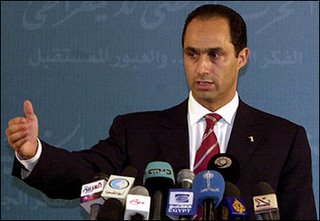
 Saturday’s sentencing of Ayman Nour to five years in prison inevitably calls to mind the eerily similar tribulations of sociologist Saad Eddin Ibrahim three years ago (Ibrahim received seven years). Both were sentenced by the same, ill-reputed judge (Adel Abdel Salam Gomaa), both were officially charged with forgery (though the legal case against Nour is even more flimsy than Ibrahim’s), and both had varying degrees of complex ties to the American administration. Both were viscerally hated by the Mubaraks (for very different reasons), and both proved very adept at capitalising on their international ties. Of course, both were not above working with the regime that later hounded and harassed them.
Saturday’s sentencing of Ayman Nour to five years in prison inevitably calls to mind the eerily similar tribulations of sociologist Saad Eddin Ibrahim three years ago (Ibrahim received seven years). Both were sentenced by the same, ill-reputed judge (Adel Abdel Salam Gomaa), both were officially charged with forgery (though the legal case against Nour is even more flimsy than Ibrahim’s), and both had varying degrees of complex ties to the American administration. Both were viscerally hated by the Mubaraks (for very different reasons), and both proved very adept at capitalising on their international ties. Of course, both were not above working with the regime that later hounded and harassed them.But here’s the key difference. Whereas Ibrahim could count his domestic supporters on the fingers of one and maybe two hands, Nour has quickly amassed a sizeable following of sympathisers and supporters. Whereas Ibrahim’s trial sessions featured a who’s who of the Cairo diplomatic set, Nour’s trial had more Egyptians than foreigners, with his young partisans filling the courtroom with fiery anti-regime slogans. Whereas Ibrahim’s sentencing was met with domestic indifference and even schadenfreude in some quarters, supporters and sympathisers of Nour immediately took to the streets to condemn his phony trial and conviction.
Not because Nour is some genuinely popular national hero, but because the presidential will to extinguish him was crystal-clear from the outset. Just as voting for the Ikhwan for many people was a satisfying slap in the face to the ruling regime, so supporting Nour for many people is a token of resistance to Mubarak senior’s abuse of power and Mubarak junior’s lust for power. No doubt there are some true believers in Ayman Nour, but there are many others pulled by the enduring allure of the protest vote, made more alluring by the fact of a stalwart regime refusing to share or otherwise redistribute its power in any way. For me and I think many others, the regime’s noises about “new thought” and all that cheap blah blah are nothing more than revolting spittle, designed to grease the wheels of the creaky, shameless, bankrupt Gamal Mubarak project.
The contrast between Ibrahim and Nour’s domestic receptions is the story of seismic shifts in Egyptian politics in the short space of just three years. Since 2002, the relationship between Egypt’s hukuma and ahali experienced an incremental loss of control by the former and new manifestations of boldness by the latter. Mubarak’s regime no longer commands the material or symbolic resources it wielded comfortably just three years ago. It is unable to innovate even its arsenal of repressive tactics. It is unable to anticipate the responses of its relevant domestic and international interlocutors and strategise accordingly. It is unable to maintain even a face-saving modicum of coherence. It’s muddling through, at best, unsure whether to crack down decisively or open up carefully. Both courses entail momentous consequences and big risks, and there’s no one in the regime who’s thinking strategically, deliberating, or planning rationally. Tsk tsk.
Mubarak’s regime never ran like a well-oiled machine, but it also never evinced the fissures and intramural wars of position currently the talk of the town. For the latest, read the eruption of the phony liberal and incorrigible prevaricator Hala Mustafa. Apparently, Ms. Mustafa has recently and miraculously discovered that Egypt’s security services are ubiquitous, nefariously thwarting the potential of true liberals like herself. But I don’t wish to despoil this space with further discussion of the poser and small time opportunist Mustafa. Anyone who knows her background, qualifications, career path, future ambitions, and current affiliation with Gamal bey’s club (aka the “Policies Secretariat”) will decipher her true motivations.
As the curtain falls on Egypt’s eventful year, and as we debate the meaning of it all and the possible trajectories from here, I’d like to conclude with an insight passed on to me by my roster of beloved teachers and mentors over the years. When approaching social analysis, assume sparingly, observe carefully, listen intently, think clearly, write lucidly, be on the lookout for the unexpected and improbable, don’t twist the facts to suit your preferences, and always, always, ask: what would prove me wrong? It’s thrilling to be right, but you learn more when you turn out to be wrong.
Happy Christmas, Hanukkah, Kwanzaa, Eid, and any additional celebrations I’ve missed. Here’s to hoping for a new year that brings in more justice, truth, and self-determination.
*Photos from AFP.
